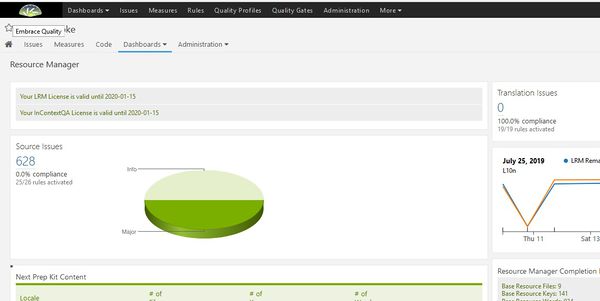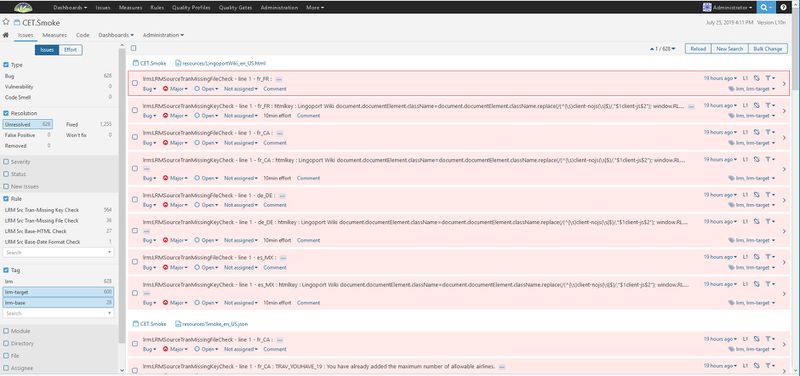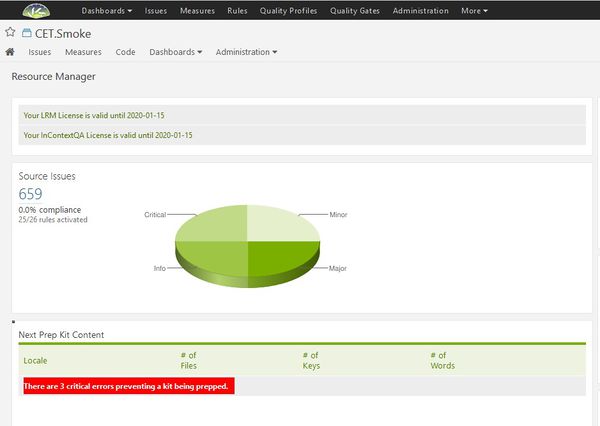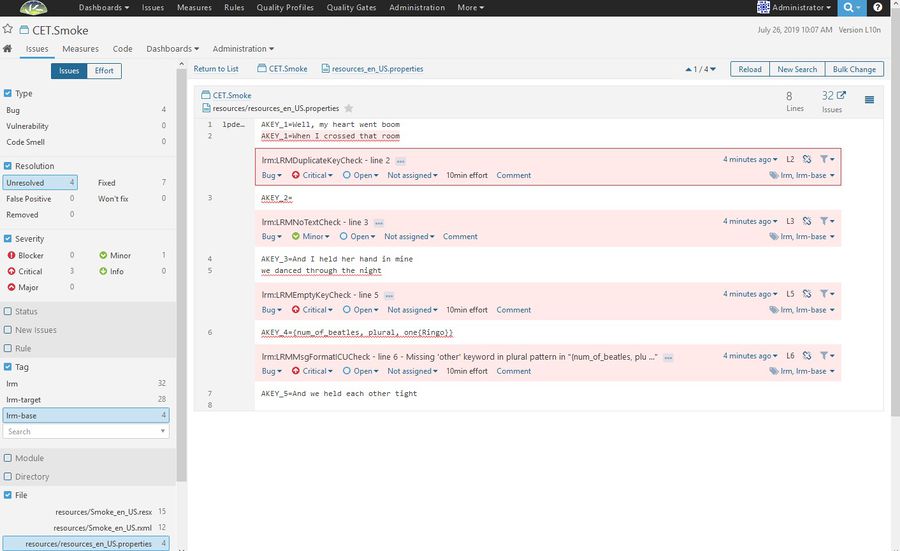Difference between revisions of "Localyzer Dashboard FAQ"
(→The Resource Manager Completion Report indicates 100% but some kits are outstanding. What does it mean?) |
|||
| Line 3: | Line 3: | ||
[[File:DashboardCompleteVTranslation.jpg]] |
[[File:DashboardCompleteVTranslation.jpg]] |
||
| − | The Completion Report is based on the base files (say, en US files) and the translated files (say de and fr) to determine how many keys, how many files, how many base words do not have a translation. If the French files, the keys in the base file, and the translated texts are present, the Completion |
+ | The Completion Report is based on the base files (say, en US files) and the translated files (say de and fr) to determine how many keys, how many files, how many base words do not have a translation. If the French files, the keys in the base file, and the translated texts are present, the Completion Report will say 100%. |
| − | If the base file text (en US for instance) has been modified, prep kits should be sent for translation. The source files still have the equivalent translated files, with all the keys and all the text, so it remains at 100%. |
+ | If the base file text (en US for instance) has been modified, prep kits should be sent for translation. The source files still have the equivalent translated files, with all the keys and all the text, so it remains at 100%. If keys are added to the base file text, the Completion Report will show lower than 100% until the new keys are translated and returned. |
= I keep getting an error on ./sonar start = |
= I keep getting an error on ./sonar start = |
||
Revision as of 17:03, 26 July 2019
Contents
- 1 The Resource Manager Completion Report indicates 100% but some kits are outstanding. What does it mean?
- 2 I keep getting an error on ./sonar start
- 3 Unable to read and import the source file: What do I do?
- 4 What are the LRM Source Issues ?
- 5 What are critical errors and how do I fix them?
- 6 Why am I getting this Date Format Check?
The Resource Manager Completion Report indicates 100% but some kits are outstanding. What does it mean?
The Completion Report is based on the base files (say, en US files) and the translated files (say de and fr) to determine how many keys, how many files, how many base words do not have a translation. If the French files, the keys in the base file, and the translated texts are present, the Completion Report will say 100%.
If the base file text (en US for instance) has been modified, prep kits should be sent for translation. The source files still have the equivalent translated files, with all the keys and all the text, so it remains at 100%. If keys are added to the base file text, the Completion Report will show lower than 100% until the new keys are translated and returned.
I keep getting an error on ./sonar start
You can try to start Sonar by launching this command in $DASHBOARD_HOME:
java -Djava.awt.headless=true -XX:MaxPermSize=128m -server -Xmx512m -Xms256m -cp lib/*:extensions/jdbc-driver/derby/*:extensions/jdbc-driver/mssql/*:extensions/jdbc-driver/mysql/*:extensions/jdbc-driver/oracle/*:extensions/jdbc-driver/postgresql.*:. org.sonar.application.StartServer
Sonar starts but then stops
This FAQ is for older versions of the Lingoport Dashboard. Systems installed after May 2018 no longer use port 9000 and this may no longer be applicable.
After starting Sonar, check the status multiple times. Sometimes, it will say that it started, but then quit after a few seconds.
> /var/lib/jenkins/lingoport/dashboard-server-5.6.1/bin/linux-x86-64/sonar.sh start Starting SonarQube... Started SonarQube. > /var/lib/jenkins/lingoport/dashboard-server-5.6.1/bin/linux-x86-64/sonar.sh status SonarQube is running (13880). > /var/lib/jenkins/lingoport/dashboard-server-5.6.1/bin/linux-x86-64/sonar.sh status SonarQube is running (13880). > /var/lib/jenkins/lingoport/dashboard-server-5.6.1/bin/linux-x86-64/sonar.sh status SonarQube is not running.
Check to see if the process is still up, even though Sonar thinks it is down. If there is no output, the process is not running.
> fuser 9000/tcp 9090/tcp: 14118 > fuser 9001/tcp 9010/tcp: 13905
Kill the processes using the following commands:
> fuser -k 9000/tcp 9090/tcp: 14118 > fuser -k 9001/tcp 9010/tcp: 13905
And start the sonar process again and check the status multiple times.
> /var/lib/jenkins/lingoport/dashboard-server-5.6.1/bin/linux-x86-64/sonar.sh start Starting SonarQube... Started SonarQube. > /var/lib/jenkins/lingoport/dashboard-server-5.6.1/bin/linux-x86-64/sonar.sh status SonarQube is running (13880).
Unable to read and import the source file: What do I do?
I'm getting this error when importing files using the Dashboard_Update.sh:
ERROR: Error during Sonar runner execution ERROR: Unable to execute Sonar ERROR: Caused by: Unable to read and import the source file : 'FILENAME HERE' with the charset : 'UTF-8'. ERROR: Caused by: Unable to persist : SnapshotSource[snapshot_id=120719,data=<?php [...] ERROR: Caused by: org.hibernate.exception.GenericJDBCException: could not insert: [org.sonar.api.database.model.SnapshotSource] ERROR: Caused by: could not insert: [org.sonar.api.database.model.SnapshotSource] ERROR: Caused by: Incorrect string value: '\xF0\x9F\x8F\x81 ...' for column 'data' at row 1
This indicates that the import part of the Dashboard is trying to read a file with an encoding (here UTF-8) which is not the encoding of the file to read, or the file is corrupted for that encoding.
Some possible solutions:
- Exclude the offending file(s) from being imported using sonar-project.properties
sonar.exclusions=com/example/tests/**,com/example/package2/*.java. - Change the encoding of the Dashboard import using sonar-project.properties
sonar.sourceEncoding=Cp1252or whatever is the right encoding for the project.
What are the LRM Source Issues ?
In the Resource Manager Dashboard, the number of LRM Issues is shown.
Selecting the issues will show all the issues and the cause for that issue and you can see the breakdown in the types of issues using the selections on the left side of the page.
For this case, the majority of the issues are LRM Src Tran-Missing File Check and LRM Src Tran-Missing Key Check which simply mean that the files have not been translated yet, so there are no translated files or keys.
See LRM Checks for more information about these issues. Unless the issues are 'Critical', these are warnings and prepkits can still be created.
What are critical errors and how do I fix them?
Suppose you have a .properties resource file that looks like:
AKEY_1=Well, my heart went boom
AKEY_1=When I crossed that room
AKEY_2=
AKEY_3=And I held her hand in mine
we danced through the night
AKEY_4={num_of_beatles, plural, one{Ringo}}
AKEY_5=And we held each other tight
When the automation job is run that contains that resource file, the result on the LRM Dashboard will look like:
Since there are critical errors, no prepkits can be created. Selecting the red text will go to the Issues page to see what the critical errors are. Opening up the file, there are actually 4 issues, but only 3 of them are critical.
The three critical issues are:
- There are two AKEY_1 values. Cannot have duplicate keys.
- "we danced through the night" has no associated key
AKEY_4={num_of_beatles, plural, one{Ringo}}is badly formatted ICU.
And one Minor issue:
- AKEY_2 has no associated text.
Fix the critical issues, check the resource file into the repository and run the automation job again and the critical errors on the LRM Dashboard should disappear.
Why am I getting this Date Format Check?
Date formats should not be the responsibility of a translator. Developers must write i18n code which handle formatting based on a locale framework.
The Date Format check is based on Java's Date Format syntax: https://docs.oracle.com/javase/tutorial/i18n/format/simpleDateFormat.html
This check indicates a string in a resource string could be a date format. For instance, the following text could be date formats:
mm/dd/yyyyDFkmh:mmmm/s
and are tagged as such potential date format.
Fcould be the "day of the week in months", etc.




